
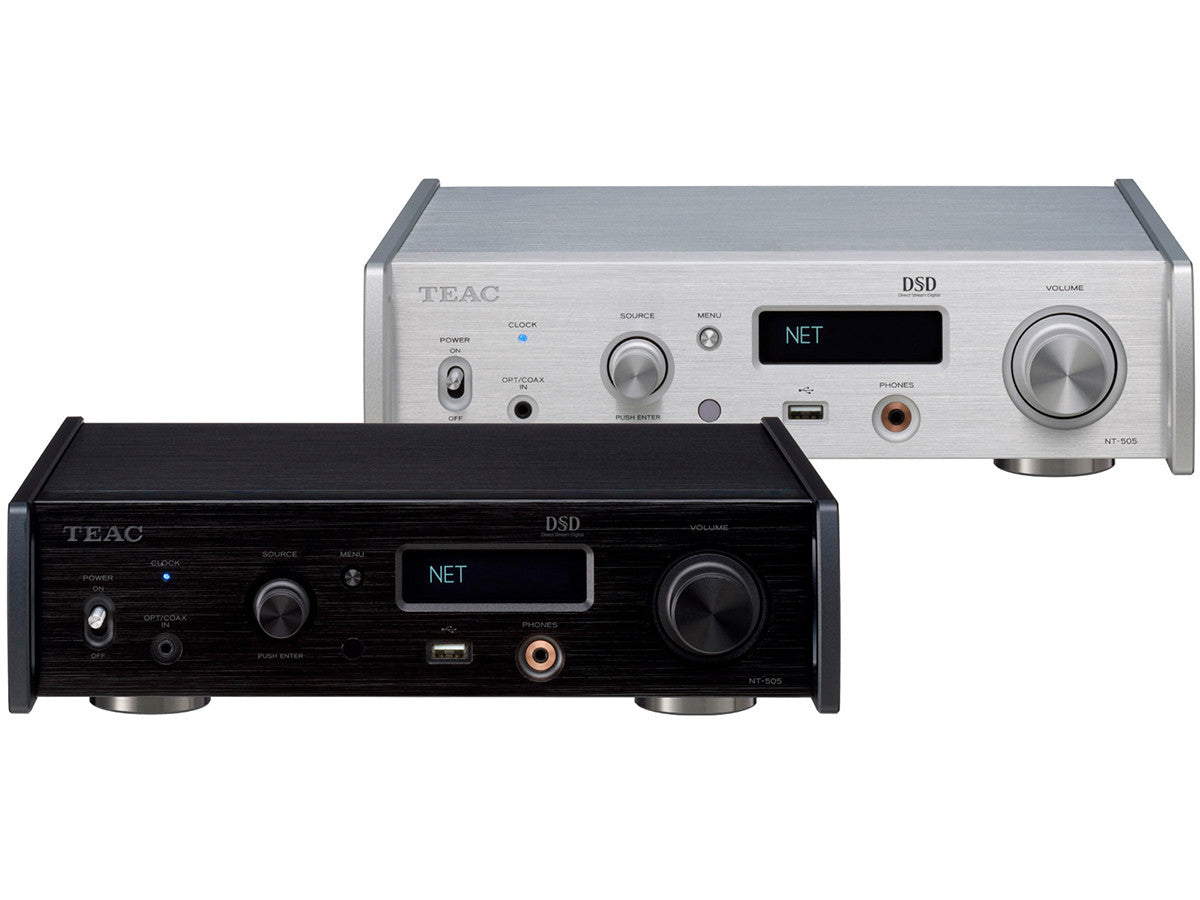
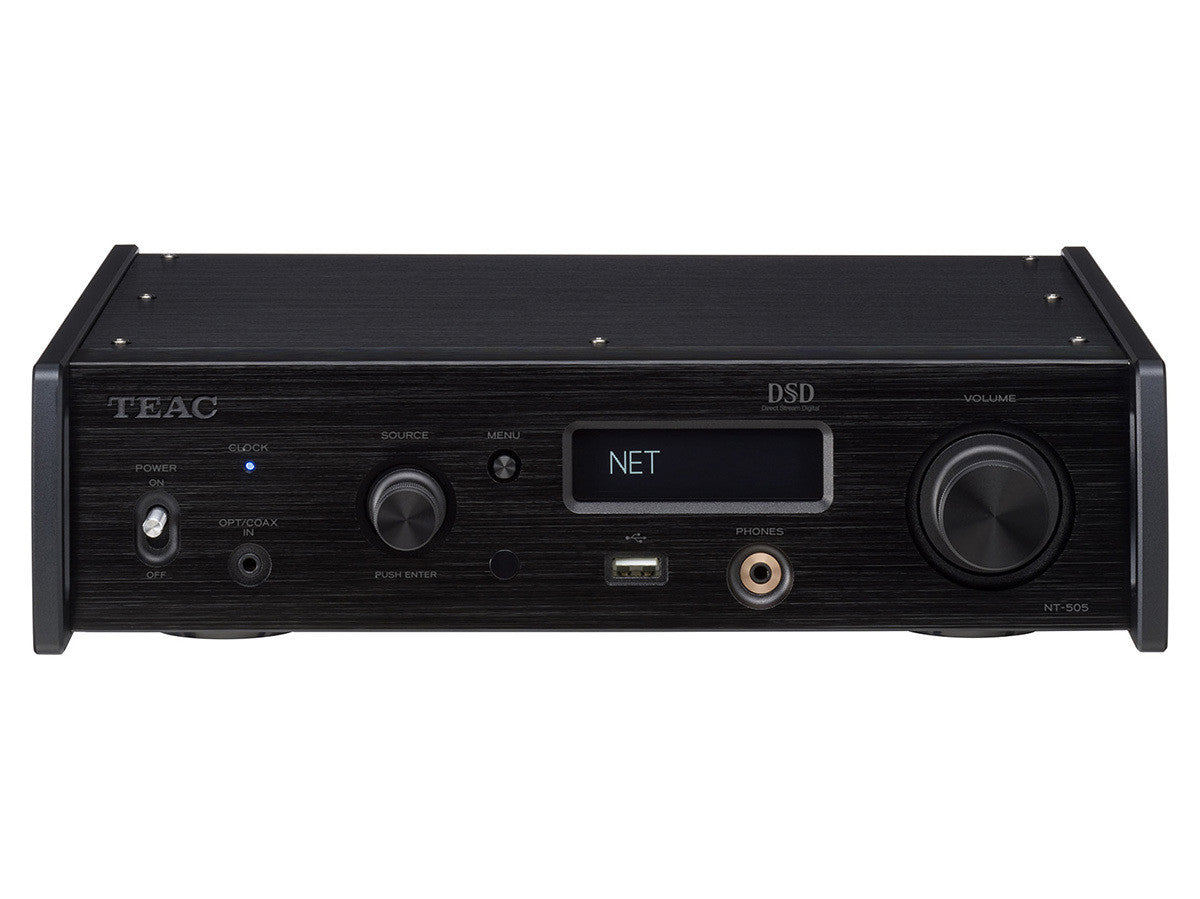
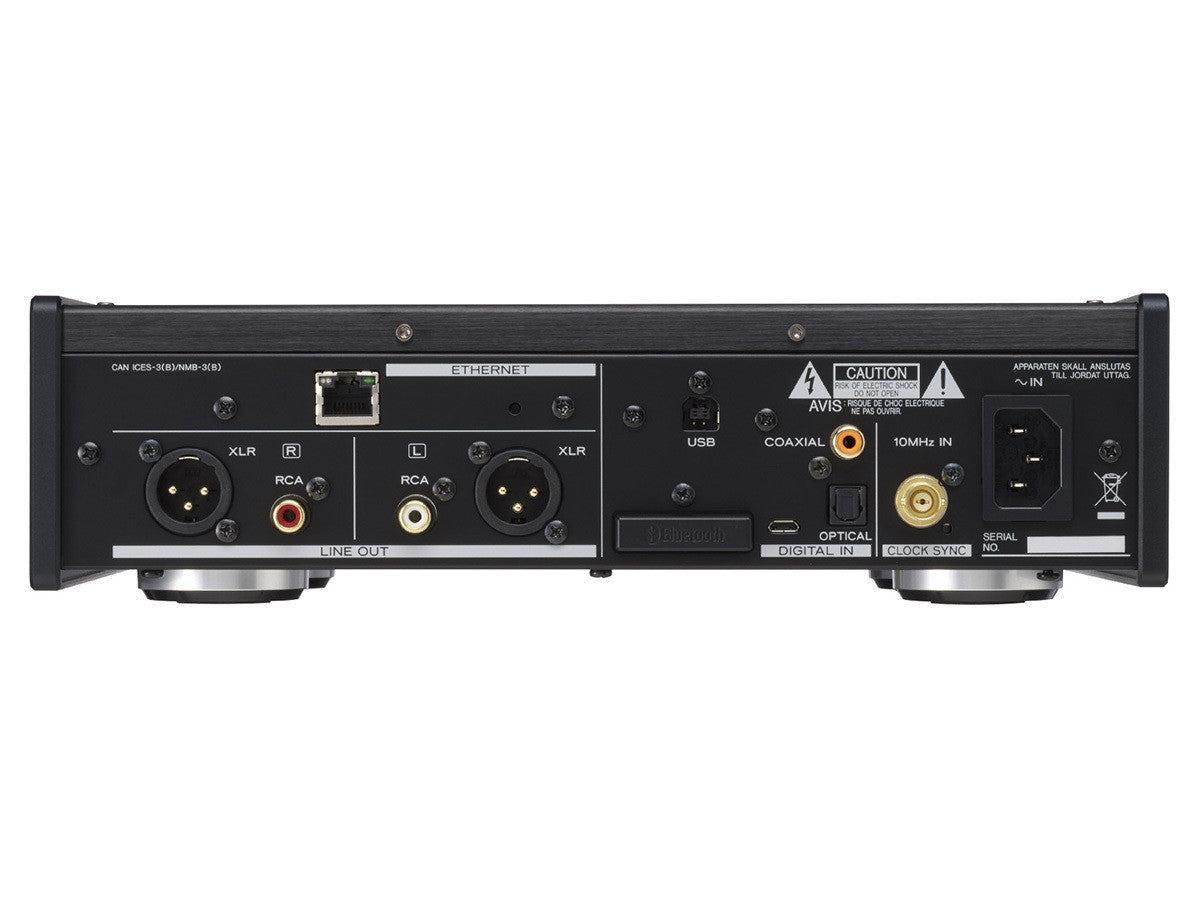
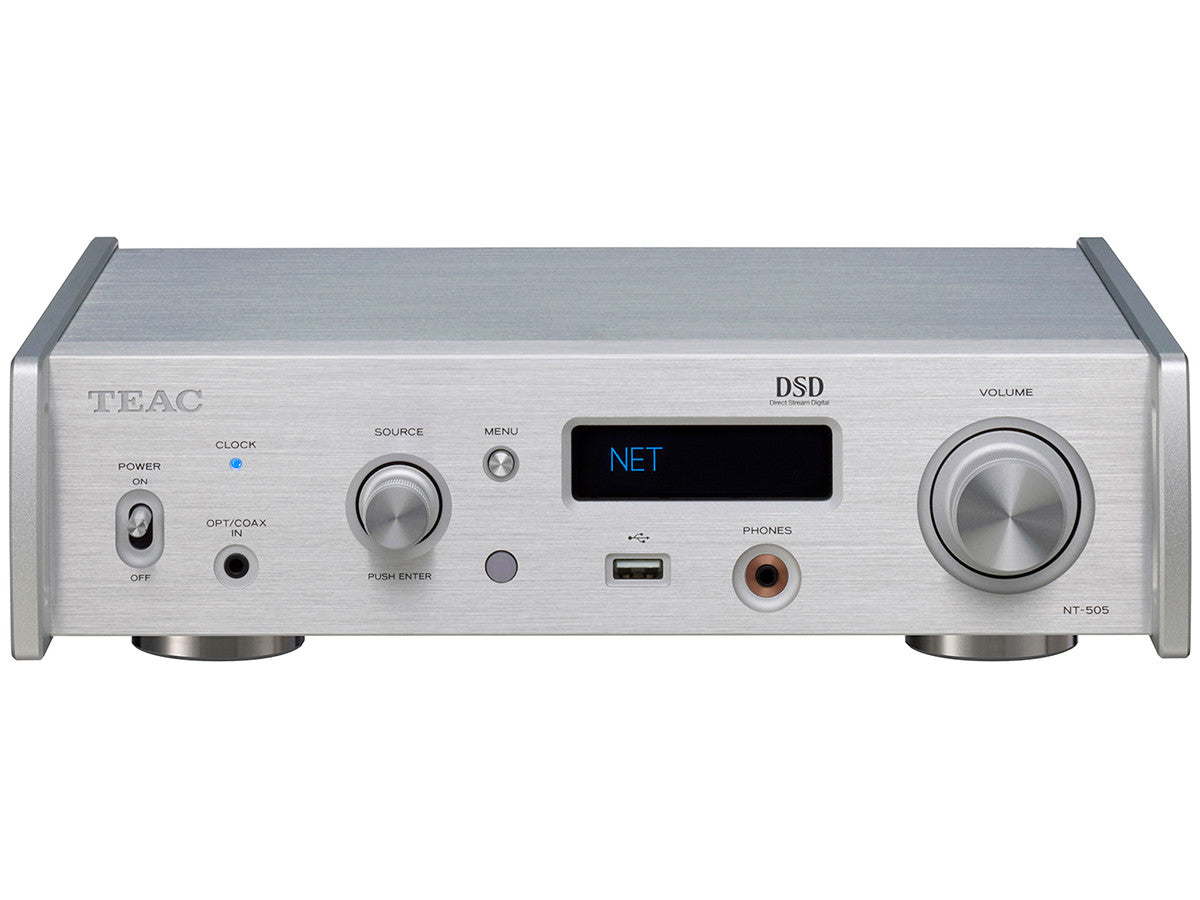
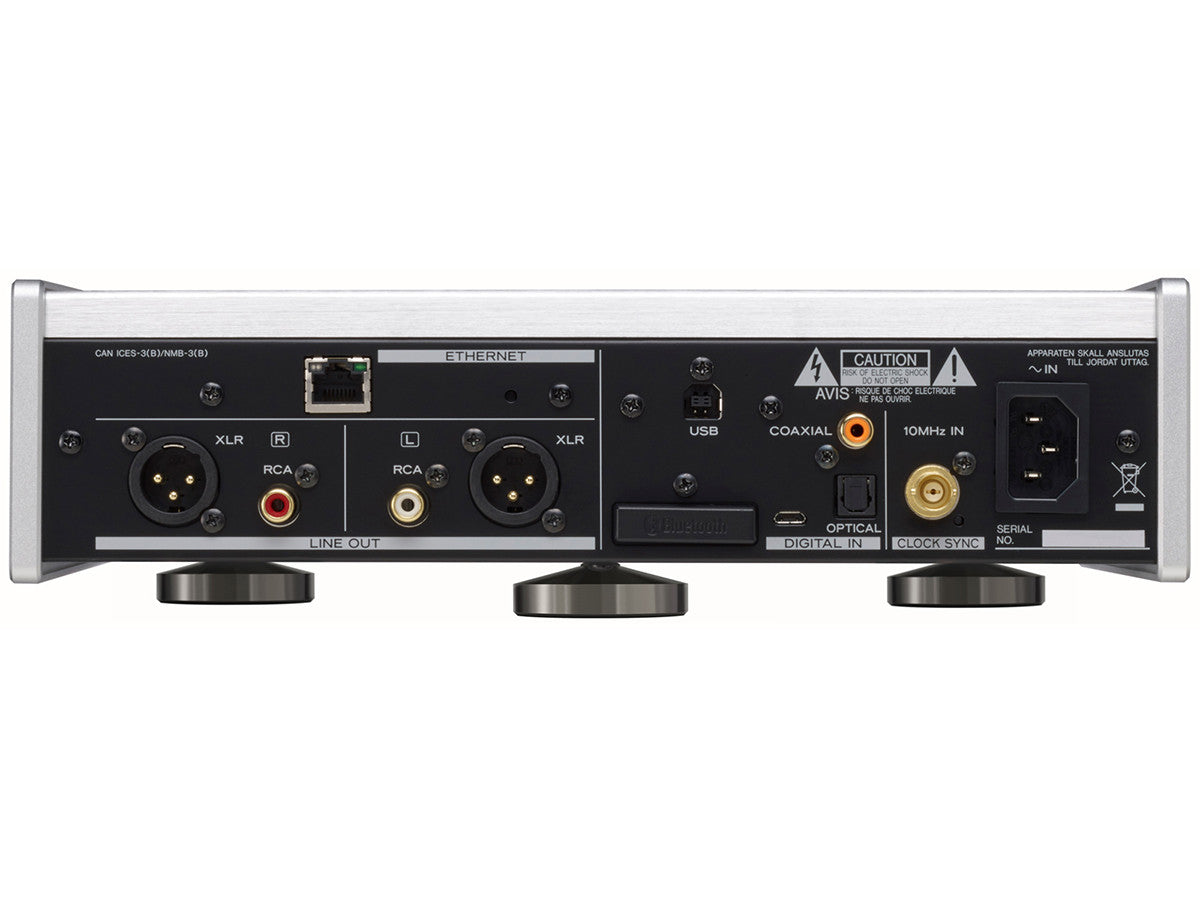
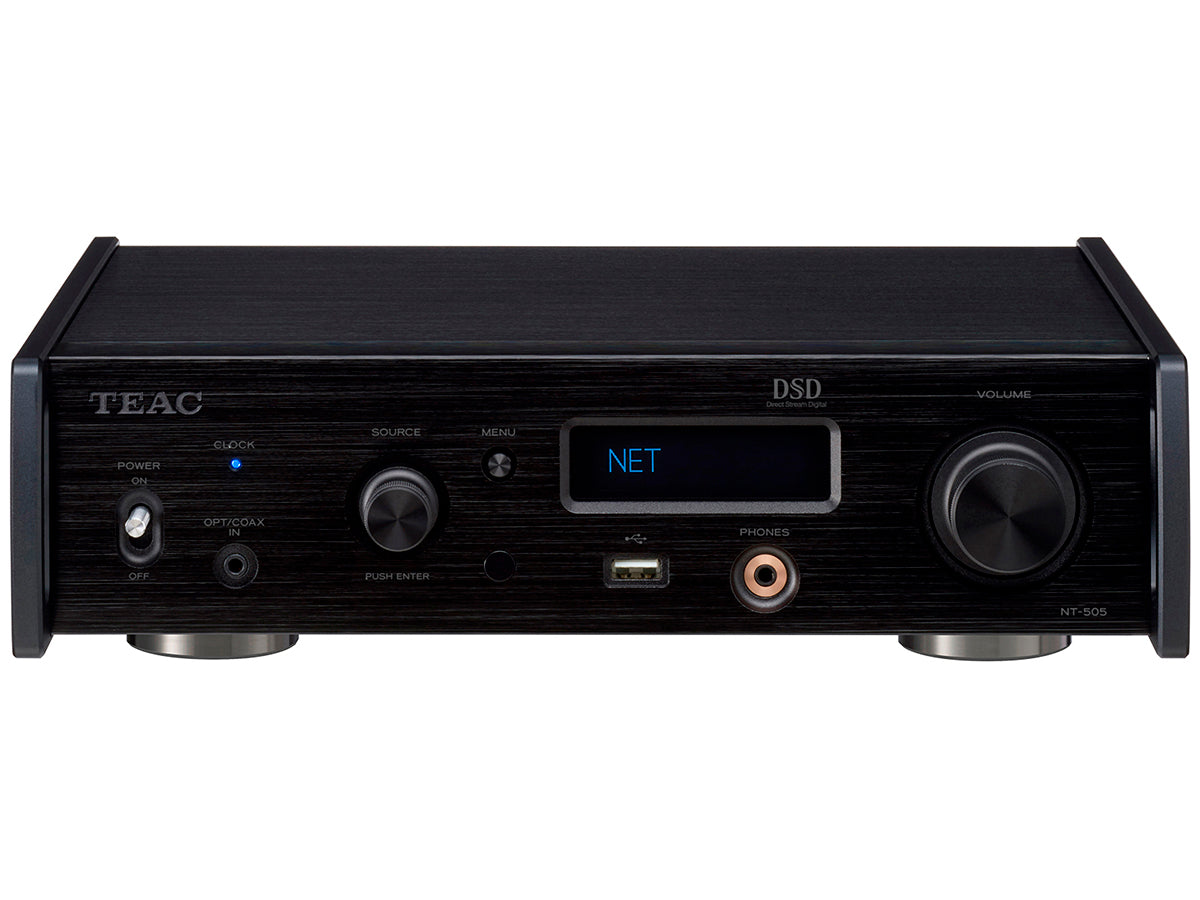
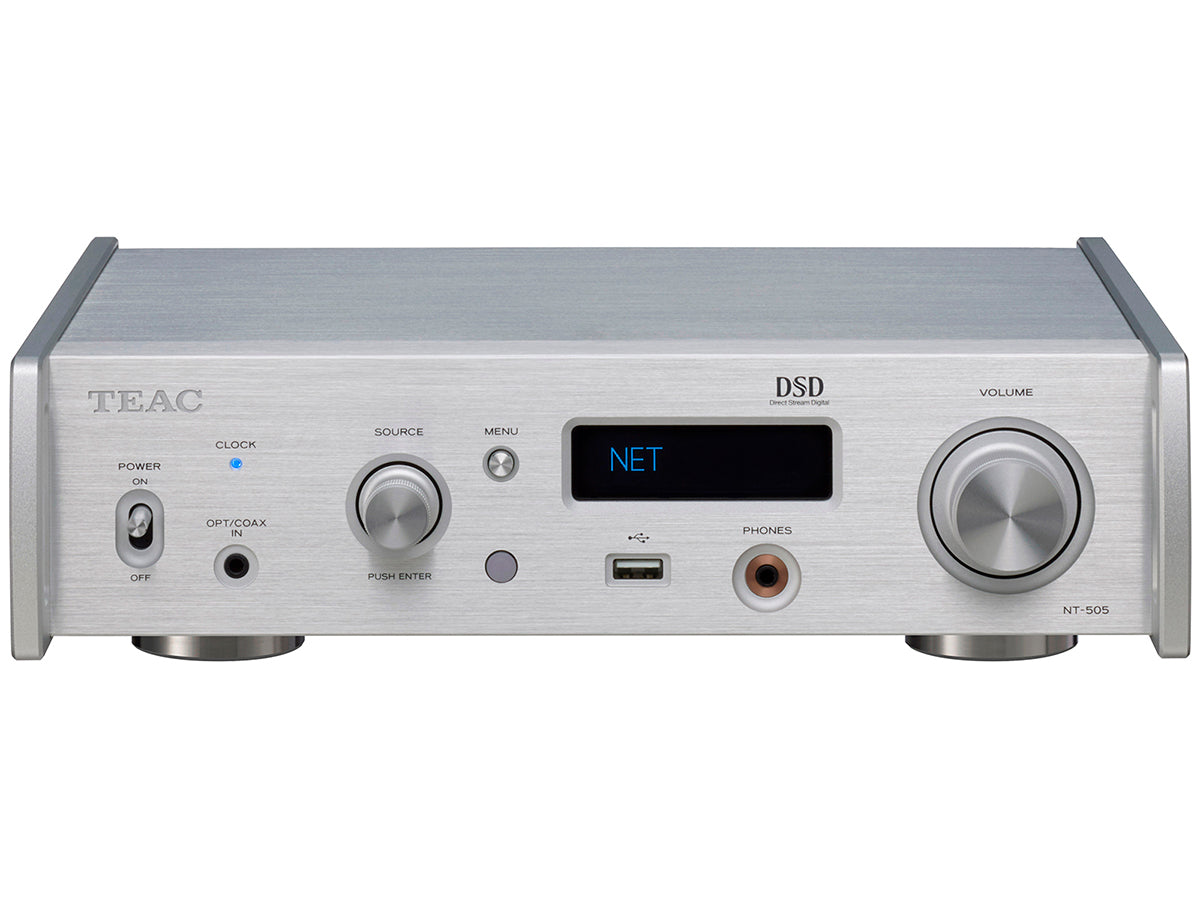



TEAC Audio
NT-505-X USB DAC Network Player
$1,849.99 USD
Features
DSD128 (5.6MHz) and PCM 192kHz/24bit Network streaming from NAS/PC
ESS Technology ES9038 Q2M converter each for left and right channels
7 types of PCM digital filters
Up-conversion up to 24.5MHz DSD and 384kHz/32bit PCM
Dual on-board clocks for 44.1kHz and 48kHz frequencies
10MHz external clock input
Supports MQA decoding
Spotify, TIDAL, and Qobuz music subscription services1
Roon Ready
Front USB port supporting Hi-Res playback from USB flash drive
Bluetooth® receiver supporting LDAC™, Qualcomm® aptX™ HD, AAC and SBC
Original TEAC-HCLD2 enhanced-current output buffer circuit
Dual monaural circuit design
Dual toroidal-core power transformers for each channel
TEAC-QVCS quad volume control system
1/8" (3.5mm) 4-pole stereo headphone jack supporting ground-separate drive
Full-dot OLED display with dimmer function
Newly-developed “Stressless Foot” design with three support points
Semi-floating design Top Panel
Bulk Pet2 USB transferring technology with four transfer modes for various sound characters
Free TEAC HR Audio Player for Windows/Mac
What's in the Box?
Warranty
A capable network player with MQA master quality decode supporting music subscription services on Internet such as Qubuz and Roon Ready, as well as connections with music servers, USB flash drives, and smartphones.

ESS Technology ES9038 Q2M high-performance DAC supports resolutions up to 22.5MHz DSD and 768kHz/32bit PCM
We have employed one DAC chip, a crucial component for digital audio, in each of the stereo channels. The ESS Technology ES9038Q2M SABRE32 Reference DAC we use has a strong reputation in the high-end audio market. Using 32-bit HyperStream® II DAC architecture and Time Domain Jitter Eliminator (both of which are ESS original technologies), an outstanding dynamic range is realized, and linearity is increased in the D/A conversion. As a result, clear and accurate audio playback with superior dynamic characteristics has been made possible.

Dual monaural circuit design and fully-balanced design
A dual monaural circuit configuration is used throughout, from the power supply (including power transformers), to the D/A converters in the digital section and the Analog output stage. From the high-performance D/A converters to the massive toroidal-core power transformers, each element is configured for single channel processing. This prevents mutual interference effects while reproducing a rich acoustic expressiveness. In addition, the Analog audio signals of both the left and right channels are processed in full balanced mode soon after the D/A converters all the way to the output terminal, contributing to an improved S/N ratio and extended dynamic range. This allows the fantastic sense of air that Hi-Res formats possess to be processed and conveyed without any losses.
Support for popular and convenient network functions, including OpenHome and Roon Ready
Common control apps that support OpenHome can be used with the NT-505-X, which also supports this platform. Moreover, playlists on the NT-505-X can be managed using TEAC HR Streamer and other control apps that support OpenHome. Gapless playback is also supported. With support for Roon Ready, functions provided by RAAT (Roon Advanced Audio Transport), including high-quality audio playback, easy and convenient operation using apps, and multi-room synchronized playback, can be used without limits.
* Support for Roon Ready will be added in a firmware update made available after product release.

Supports Spotify Connect, TIDAL, Qobuz, and TuneIn
By connecting the unit to a home network using a LAN cable, music files saved on NAS music servers and computers can be accessed and played back. In addition, this unit also supports the Spotify, TIDAL, and Qobuz subscription Internet music streaming services. These enable listening to tens of millions of lossless CD-quality (44.1kHz/16bit) music tracks.

MQA decoder for master quality streaming
In order to achieve an Analog waveform closer to the original signal, the NT-505-X supports MQA decoding while also supporting high sampling rate Hi-Res formats like DSD512 (22.5MHz) and PCM 32bit/768kHz. The MQA decoder is a totally new technology that controls Analog waveforms with excellent precision (as fine as 5 microseconds) and it reproduces sound in a manner that is perceived to be as close as possible to the original (to human hearing). Furthermore, a high-efficiency compression algorithm makes huge Hi-Res audio files compact in size, so you will be able to enjoy Hi-Res audio sources regardless of the speed of your Internet connection

High-quality wireless audio streaming via Bluetooth®
In addition to conventional SBC and AAC codecs, the NT-505-X also supports LDAC™ (24bit/96kHz Hi-Res audio transmission), and Qualcomm® aptX™ HD, a codec that uses 24bit/48kHz format transmission. These allow you to playback playlists on your smartphone and tablet wirelessly.

Hi-Res audio playback from USB flash drive
The USB port on the front panel allows you to playback Hi-Res audio formats including DSD128 (5.6MHz) and PCM 24bit/192kHz downloaded from Internet or digitally recorded with the SD-500HR.
Dual onboard clocks for 44.1k and 48kHz, and an external clock input
Instead of referencing to an unstable and noisy PC clock during USB audio playback, a more accurate and on-board clock is generated by a high-precision, low phase-noise, audio-grade crystal oscillator for USB asynchronous transfer mode. The NT-505-X accommodates two on-board clocks exclusively for 44.1kHz and 48kHz sampling frequencies and applies the appropriate one to incoming digital signals - those that are multiples of 44.1k or 48k - to reproduce identical sound to the original by eliminating jitter effects on the audio signal. In addition, an external 10MHz clock input is also provided, to synchronize with an even higher-precision master clock generator, such as the TEAC CG-10M/CG-10M-A, for yet further upgraded audio playback with excellent sound quality.

Up-conversion up to 384kHz/32bit PCM and 24.5MHz DSD
Employing RDOT-NEO (Refined Digital Output Technology NEO), a fluency algorithm that renders digital audio signals smoothly, the NT-505-X up-converts PCM digital signals up to 384kHz/32bit PCM and 24.5MHz DSD. With the up-conversion function activated, you will hear an improvement in quality, even with music that you are familiar with.

"Bulk Pet" USB transfer technology for enhanced audio quality
When transferring large volumes of digital data for Hi-Res audio sources through USB cables using conventional isochronous transfer mode, large variations can occur in the processing loads of the sending computer and the receiving USB DAC. This can cause sound to drop out and other problems to occur. However, with our new USB transmission technology - dubbed "Bulk Pet" - a fixed amount of data is transmitted constantly, levelling out the processing burden on both devices and contributing to stable data transmission. Changing the processing burden on the computer directly affects audio quality so users can select the setting they prefer (from four transmission modes).。
"Bulk Pet" is a registered trademark of Interface Corporation. For more information about "Bulk Pet", please visit the Interface Corporation website.

7 types of PCM digital filters
There are seven types of PCM digital filters, allowing you to apply the filter that best matches the file format or type of music you're listening to. The filter can be changed at the touch of a button on the remote control, allowing you to enjoy the different sonic nuances of each filter.
Dual high-capacity toroidal-core power transformers
The dual monaural theme continues. Two over-sized high-capacity toroidal-core power transformers are employed in the NT-505-X, supplying stable, individual current sources for each of the left and right channels. This means neither channel will be affected by changes in the power consumption of the other during digital processing.
Analog output circuits have been further refined
Improved TEAC-HCLD2 enhanced-current output buffer amp circuit
We employed the TEAC-HCLD 2 for the analog output circuit. This is a further improved version of the TEAC-HCLD circuit enhanced-current output buffer amp that increases crucial current output capacity (HCLD: High Current Line Driver). This model now uses line buffer ICs with extremely high current output capacity. By using a positive-negative two-circuit structure for each channel, drive can be differential with balanced output and parallel with unbalanced output. Transmitting audio signals without degrading their dynamism becomes possible with increased current supply capacity.

TEAC-QVCS four-circuit-structure high-precision volume control newly incorporated for preamp circuits
TEAC-QVCS (Quad Volume Control System) is used for the volume circuit. This electronic volume control is a variable gain amp type comprised of four discrete circuits for left, right, positive and negative (L+, L−, R+, R−). By placing the variable gain amp volume control, which processes in analog, in the audio signal path on the circuit board, issues with noise resulting from diverging wiring are avoided. Furthermore, this TEAC-QVCS enables volume adjustment in 0.5dB increments, allowing you to set the perfect volume for your audio system or headphones.
Carefully crafted line amp section can also be used as a headphone amplifier
The improved TEAC-HCLD2 circuit also has high drive capability as a headphone amp enabling it to maximize the potential of a variety of types of headphones, starting with 600Ω high-impedance models. In addition, the NT-505-X supports the Ground Separate connection by separating circuit ground on both Left and Right channels from the amplifier section to the headphone jack, to improve channel separation that is crucial for headphone listening, while delivering clear sound with wide visible sound stage.

Physical design with extreme attention to detail
All-metal enclosure provides both vibration resistance and a stylish appearance in an A4 footprint that can fit on a desk
Since the entire body is constructed from metal panels that are resistant to external noise, intrusion of electromagnetic noise generated by computers and other devices is suppressed. A clean internal environment with little noise has been realized even in conditions that are difficult for audio equipment. Furthermore, 8mm-thick aluminum panels covering both sides of the all-metal chassis provide a strong and stable structure that prevents twisting and bending. Moreover, being the size of an A4 page* (viewed from above), the unit can be placed on a desk, side table or other small space.
*This excludes the connectors, knobs and other protrusions.
Symmetrically laid out XLR and RCA output jacks
The NT-505-X is equipped with both balanced and unbalanced Analog audio outputs. A pair of XLR connectors and another pair of RCA connectors - each gold-plated - are symmetrically laid out, hinting at the dual monaural arrangement inside, and allowing a wide range of possible audio configurations. A wide-spaced pitch layout for the RCA outputs accommodates professional grade plugs with large-diameter shells. The NT-505-X has a total of 5 digital inputs: USB audio, coaxial, optical on the rear panel, and a combination jack on the front panel (for coaxial and optical, supporting PCM 24bit/192kHz and DSD64 (2.8MHz) in DoP format).

Newly-developed Stressless Foot design
Our newly-developed original Stressless Foot design with three support points enables stable placement of the unit so that it is not impacted by slight irregularities in the surface beneath it. Compared to the original feet used in previous designs, these feet are only partially fixed to the chassis. This design was developed based on the concept that by allowing the feet to vibrate freely, more natural sound reverberations could be achieved. The tops of the conical feet, which are made of machined steel, are attached so that they hang from the bottom of the chassis and swing freely when the unit is lifted. While maintaining a sense of placement like that of the pin-point spiked feet used by previous models, this design enables more natural rich reverberations.
Semi-floating design Top Panel
A semi-floating structure is newly used for the top panel. It has achieved a sound with an excellent sense of openness.
Free TEAC HR Audio Player software for DSD512 playback on both Windows and Mac
The next-generation Hi-Res formats, DSD512 (22.5MHz) and PCM 768kHz/32bit are supported via the TEAC HR Audio Player software for Windows and Mac. This software guarantees the best available playback quality with any combination of audio format and computer configuration via a single USB cable. All the user has to do is choose the NT-505-X from the pull-down menu showing target output devices. The TEAC HR Audio Player is downloadable from TEAC's web site, and is completely free to use.

Free TEAC HR Streamer app for iOS/Android devices
Supporting Hi-Res audio formats up to 5.6MHz DSD and 192kHz PCM, this free app for iOS and Android devices allows you to control wireless streaming music playback from a device, NAS, computers and the Internet, along with rich graphic information such as album artwork.
* Wi-Fi network is required to use the App

Features at a glance
- Hi-Res audio playback supporting DSD512 (22.5MHz) and PCM 768kHz/32bit PCM
- DSD128 (5.6MHz) and PCM 192kHz/24bit Network streaming from NAS/PC
- ESS Technology ES9038 Q2M converter each for left and right channels
- 7 types of PCM digital filters
- Up-conversion up to 24.5MHz DSD and 384kHz/32bit PCM
- Dual on-board clocks for 44.1kHz and 48kHz frequencies
- 10MHz external clock input
- Supports MQA decoding
- Spotify, TIDAL, and Qobuz music subscription services
1 - Roon Ready
- Front USB port supporting Hi-Res playback from USB flash drive
- Bluetooth® receiver supporting LDAC™, Qualcomm® aptX™ HD, AAC and SBC
- Original TEAC-HCLD2 enhanced-current output buffer circuit
- Dual monaural circuit design
- Dual toroidal-core power transformers for each channel
- TEAC-QVCS quad volume control system
- 1/8" (3.5mm) 4-pole stereo headphone jack supporting ground-separate drive
- Full-dot OLED display with dimmer function
- Newly-developed “Stressless Foot” design with three support points
- Semi-floating design Top Panel
- Bulk Pet
2 USB transferring technology with four transfer modes for various sound characters - Free TEAC HR Audio Player for Windows/Mac
| Supported formats | |
|---|---|
| USB input | |
| PCM | 16/24/32 bit |
| 44.1k/48k/88.2k/96k/176.4k/192k/352.8k/384k/705.6k/768k Hz | |
| DSD | 2.8M/5.6M/11.2M/22.5M Hz |
| Coaxial digital input | |
| PCM | 16/24 bit |
| 32k/44.1k/48k/88.2k/96k/176.4k/192k Hz | |
| DSD | 2.8MHz(supported with 176.4kHz/24-bit DoP format) |
| Optical digital input | |
| PCM | 16/24 bit |
| 32k/44.1k/48k/88.2k/96k/176.4k/192k Hz | |
| DSD | 2.8MHz(supported with 176.4kHz/24-bit DoP format) |
| DAC section | |
| USB DAC | ESS Technology ES9038 Q2M ×2 |
| Up-conversion | up to 384kHz/32-bit PCM, 24.5MHz DSD |
| LAN section | |
| Connector | RJ-45×1(1000Base-T) |
| MQA Decoder | Built-in |
| Audio inputs | |
| USB (rear) | USB B port, USB 2.0, asynchronous mode transfer, bulk transfer |
| Compatible Software | TEAC HR Audio Player (Windows, Macintosh) |
| COAXIAL digital (rear) | RCA pin×1 (gold-plated) |
| Input level | 0.5Vp-p |
| Input impedance | 75Ω |
| Optical digital (rear) | TOS-link×1 |
| Input level | -24.0 to -14.5dBm peak |
| Coaxial digital (front) | 1/8” (3.5mm) mini×1 (combined with optical digital input, detected automatically) |
| Input level | 0.5Vp-p |
| Input impedance | 75Ω |
| * 1/8” Mini - RCA conversion cable included. | |
| Optical digital (front) | 1/8” Mini Optical×1 (combined with coaxial digital input, detected automatically) |
| Input level | -24.0 to -14.5dBm peak |
| USB (front) | USB A port |
| Supported media | USB Flash Drive |
| Bluetooth® | |
| Bluetooth® version | 4 |
| Output class | Class2 (Range: approx. 33ft/10m) |
| Supported profiles | A2DP, AVRCP |
| Content protection | SCMS-T |
| Supported codec | LDAC™, Qualcomm® aptX™ HD, aptX™, AAC, SBC |
| No. of paired device | maximum 8 devices |
| Audio outputs | |
| XLR balanced | XLR×1 pair (gold-plated) |
| Output level | Fixed (0dB), fixed (+6dB), variable, output off (selectable) |
| Maximum output leve | 2.0Vrms (1kHz, full scale, into 10kΩ, when set to fixed (0dB)) |
| 4.0Vrms (1kHz, full scale, into 10kΩ, when set to fixed (+6dB)) | |
| 12.0Vrms (1kHz, full scale, into 10kΩ, when set to variable) | |
| Output impedance | 188Ω |
| RCA unbalanced | RCA pin×1 pair (gold-plated) |
| Output level | Fixed (0dB), fixed (+6dB), variable, output off (selectable) |
| Maximum output leve | 2.0Vrms (1kHz, full scale, into 10kΩ, when set to fixed (0dB)) |
| 4.0Vrms (1kHz, full scale, into 10kΩ, when set to fixed (+6dB)) | |
| 6.0Vrms (1kHz, full scale, into 10kΩ, when set to variable) | |
| Output impedance | 150Ω |
| Headphone outputs | |
| Connector | 1/8” (3.5mm) Stereo TRS jack×1 (gold-plated) |
| Polarity | Tip:L+, Ring1:R+, Ring3:L-, Sleeve:R- |
| Maximum output | 500mW + 500mW (into 32Ω) |
| Supported impedances | 16 to 600Ω |
| Clock section | |
| Internal clock | |
| Type | Crystal oscillator |
| Number of clocks | 2 (44.1kHz and 48kHz) |
| External clock input | |
| Connector | BNC (gold-plated) |
| Input frequency | 10MHz |
| Input impedance | 50Ω |
| Input level | Rectangle wave: equivalent to TTL levels |
| Sine wave: 0.5 to 1.0 Vrms | |
| Audio performance | |
| Frequency Response | 10 to 80,000 Hz (+1/-3 dB, 192kHz PCM input, RCA output, digital filter off) |
| Total harmonic distortion | 0.002% or less (192kHz PCM input, RCA output, digital filter off) |
| S/N ratio | 110dB or higher (192kHz PCM input, RCA output, digital filter off) |
| Power supply | |
| US/Canada | AC 120V 60Hz |
| UK/Europe | AC 220 to 240V 50Hz |
| Power consumption | 18W (0.4W in standby) |
| dimensions (including protrusions) | 290(W)×84.5(H)×248.7(D) mm / 11.4”(W)×3.3”(H)×9.8”(D) |
| Weight | 4.1kg / 9.1lbs |
| Included accessories | Power cord, RCA mini plug adapter cable, remote control (RC-1330),2 AAA batteries for remote control, Owner's Manual (with warranty) |
Up-conversion table
| Input Frequency | Up-converted Frequency | ||||||
| Coax/Opt | USB | off | 2Fs | 4Fs | 8Fs | DSD256 | DSD512 |
| 32kHz | - | 32kHz | 64kHz | 128kHz | 256kHz | 8MHz | 16MHz |
| 44.1kHz | 44.1kHz | 44.1kHz | 88.2kHz | 176.4kHz | 352.8kHz | 11.2MHz | 22.5MHz |
| 88.2kHz | 88.2kHz | 88.2kHz | 88.2kHz | 176.4kHz | 352.8kHz | 11.2MHz | 22.5MHz |
| 176.4kHz | 176.4kHz | 176.4kHz | 176.4kHz | 176.4kHz | 352.8kHz | 11.2MHz | 22.5MHz |
| - | 352.8kHz | 352.8kHz | 352.8kHz | 352.8kHz | 352.8kHz | 11.2MHz | 22.5MHz |
| - | 705.6kHz | 705.6kHz | 705.6kHz | 705.6kHz | 705.6kHz | 11.2MHz | 22.5MHz |
| 48Hz | 48Hz | 48kHz | 96kHz | 192kHz | 384kHz | 12.2MHz | 24.5MHz |
| 96kHz | 96kHz | 96kHz | 96kHz | 192kHz | 384kHz | 12.2MHz | 24.5MHz |
| 192kHz | 192kHz | 192kHz | 192kHz | 192kHz | 384kHz | 12.2MHz | 24.5MHz |
| - | 384kHz | 384kHz | 384kHz | 384kHz | 384kHz | 12.2MHz | 24.5MHz |
|
- |
768kHz | 768kHz | 768kHz | 768kHz | 768kHz | 12.2MHz | 24.5MHz |
Comparison with previous models
| NT-505-X | NT-505 | NT-503 | |
| D/A Converter | ES9038 Q2M ×2 (L/R) | AK4497 ×2 (L/R) | AK4490 ×2 (L/R) |
| DSD | 22.5MHz maximum | 22.5MHz maximum | 11.2MHz maximum |
| PCM | 768kHz/32-bit maximum | 768kHz/32-bit maximum | 384kHz/32-bit maximum |
| Up-conversion(maximum) | DSD: 24.5MHz (DSD 256, 512) PCM: 384kHz/32-bit (2fs, 4fs, 8fs) |
DSD: 24.5MHz (DSD 256, 512) PCM: 384kHz/32-bit (2fs, 4fs, 8fs) |
DSD: 12.2MHz (DSD 256) PCM: 384kHz/32-bit (2fs, 4fs, 8fs) |
| Dual mono | Yes | Yes | Yes |
| Current buffer circuit | TEAC-HCLD2 | TEAC-HCLD | TEAC-HCLD |
| TEAC QVCS circuit (high-precision volume) |
Yes | Yes | Yes |
| Line/balanced outputs | Yes | Yes | Yes |
| Line parallel/unbalanced outputs | Yes | Yes | Yes |
| High-precision dual clock | Yes | Yes | Yes |
| External clock input (10MHz) | Yes | Yes | Yes |
| Preamplifier function | Yes | Yes | Yes |
| Bulk Pet transmission | Yes | Yes | - |
| MQA decoder | Yes | Yes | - |
| Line output level switching |
|
|
|
| Front digital input | Yes (Combined coaxial/optical mini jack) |
Yes (Combined coaxial/optical mini jack) |
Yes (Combined coaxial/optical mini jack) |
| Bluetooth® input (supported codecs) | LDAC™, aptX™ HD, AAC, SBC | LDAC™, aptX™ HD, AAC, SBC | aptX™, AAC, SBC |
| Headphone amplifier circuit | Current-strengthening circuit | Current-strengthening circuit | Current-strengthening circuit |
| Headphone drive method | Ground separate | Ground separate | Parallel unbalanced |
| Headphone output jack | 1/8” (3.5mm) Stereo TRS×1 | 1/8” (3.5mm) Stereo TRS×1 | 1/8” (3.5mm) Stereo TRS×1 |
| Feet | Stressless Pin-point foot | Pin-point foot | Conventional insulated foot |
| Remote control | Yes | Yes | Yes |
